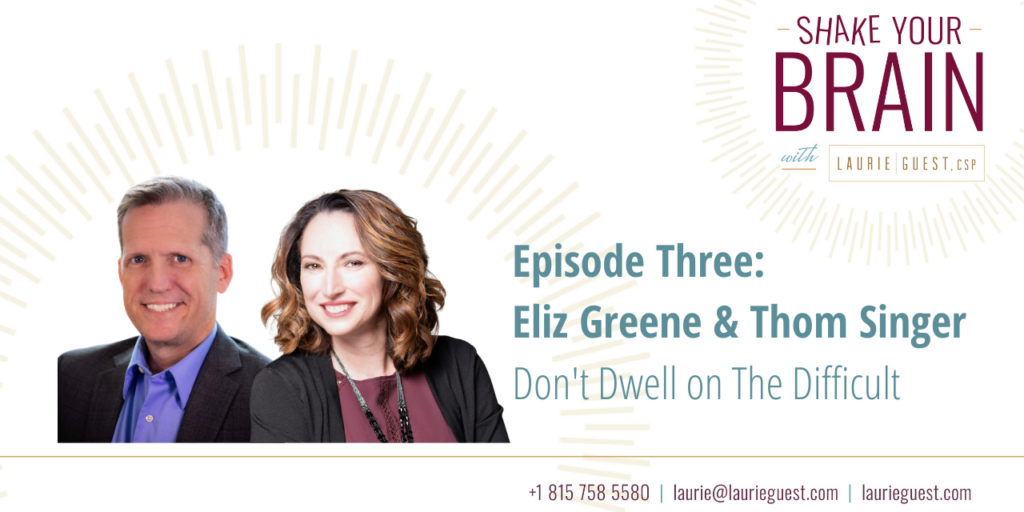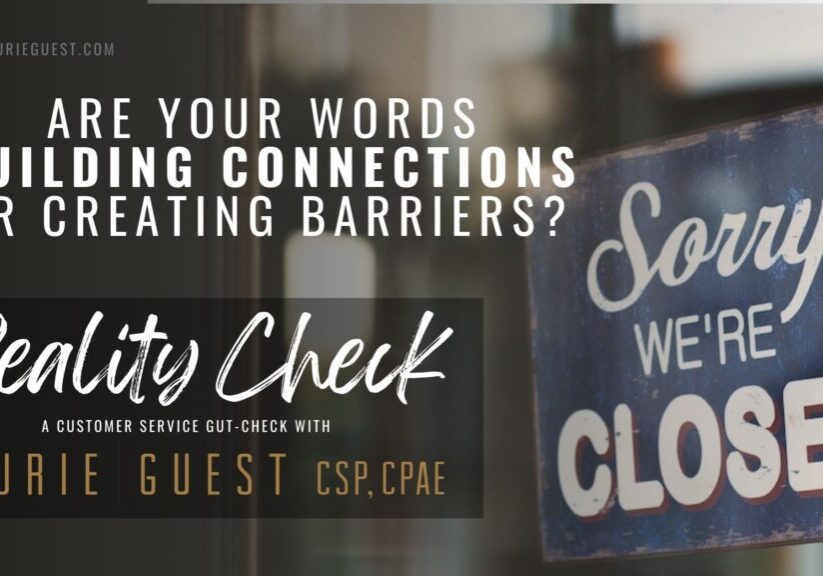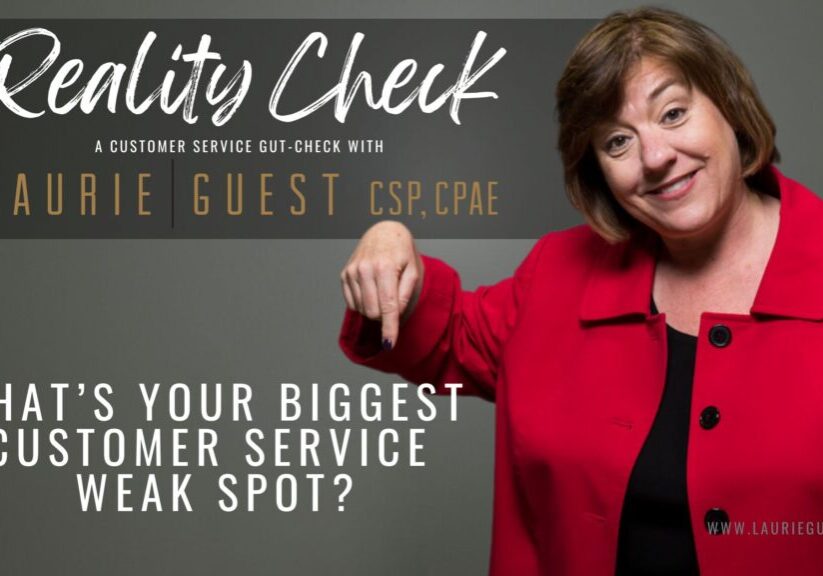In this episode, I invite the dynamic duo of Thom Singer and Eliz Greene. They both have an interesting background, which you can read on the show page, but the part I want to highlight in this short video introduction, is their series called the Webinar Talk Show where they interview a variety of industry specialists about what’s happening in our virtual world of learning and performing.
They’re fans of saying “don’t cancel the event” and I couldn’t agree more. They excel at emcee work both alive and online. And they’re going to give us a little insight of that today. Also, this is a double feature of content because after they tell me something new, I share one way that each of them has done a “shake” to my brain in the past.
So get out your pen if you can, because there’s a profound lesson coming your way.
Laurie: Hey everybody. And welcome to another episode of shake your brain. Today I have two of my favorite people, Thom Singer and Eliz Greene, who have always taken the time to shake my brain with cool things over the years. So they were one of the first people I thought of to invite onto the show. So welcome my friends.
Thom and Eliz: Thank you. Thanks for having us.
Laurie: And so just to give a brief background to the people watching who may not already know. Long before the pandemic hit, the two of you were already going to the airwaves and doing live streaming at conventions and association meetings to bring the outside world right into where the convention has happening. And so you already knew a little bit, you were already on the cutting edge of this, right?
Eliz: We were and in in fact, one of the things that we use to describe what we do is that we’re the eyes, ears, and voice of the virtual audience.
Laurie: The main thing I wanted to dive in today is you recently did this for the National Speakers Association.We have a large event every year that happens in the summer. And we knew early on, we were probably going to have to go virtual with it. So the team did an amazing job of letting us see all the breakouts this time, which was one of the advantages, we didn’t have to pick and choose. And I have watched almost every single one of the programs and enjoyed them.
And I realized while I was watching it, that the two of you had a front row seat to every single speaker, because you brought them on, you introduce them and then fed them questions from the audience. So if you did have the ability to really listen to them while they were working, I’m thinking you each have an “A-ha!” of some kind, your own little brain shake and I specifically asked you not to tell me in advance what it is so that I could, I could decide. Yeah, I agree. I’m shaking my brain too, or, Oh, good for you. It shook your brain, but not mine. And that’s the fun of not knowing in advance.
So Thom, I’m actually picking on you first. Tell me what moment or phrase or concept that you heard that made you go, “Huh…shaking my brain a little!”
Thom: Well, Laurie, we did 25 of these interviews. So we had 25 unique personalities with unique speaking styles and content. And Eliz and I had to have a production call with everybody because we had to be able to fit them and their intention into sort of the talk show format that we created, which meant that we needed to work with them.
And the thing that really sort of shook my brain was not everybody was super easygoing. There were some people who said, no, I don’t need Thom and Eliz. I just want the whole hour to do my presentation and that wasn’t the format so that wasn’t allowed. And then others said, “I don’t do production calls, I’m a professional speaker.” And the answer was so as everyone who will be doing one of these and what I walked away with for my own speaking career is that that sound check that often happens the day before. I’ve never really taken it seriously because the sound company is going to do a great job. They’re going to put a microphone on me. I’ve never worried about it. And sometimes I say, “Oh, I don’t have to do that.”
What I walked away with is the soundcheck isn’t for the speaker. It’s for the team, the meeting planner, the sound crew, the stage crew it’s for them, not for me. And so I never again will we’ll approach a sound check lackadaisical, I will go in fully prepared to give them whatever they need.
Laurie: Oh, I think that is an excellent reminder for all of us, for my clients who might be listening, who are not even in the speaking world, the same rule applies. How are you easy to work with and where are you difficult to work with?
I have a really brief example. I just ordered one of these. I don’t know if you guys have seen this, but it is a really cool – your signature and it may not even be your signature, but it’s an animated version of a really neat looking signature and you can add it to the end of your video reels or whatever. So I ordered one of these really neat ordered one online. It came back and all it says is approve or don’t approve. It doesn’t give me any place to say yes, I approve it as long as you put a little loop on the L and where’s the rest of the order, which is the animated version. Long story short, we’ve had four emails back and forth and every time they respond to me like a robot, maybe it is a robot. I don’t know, but they’re not easy to work. Which means right now you guys are two potential referrals. I could say to both of you, you guys need to hop on this website. You guys are going to love having this photo signature. But instead of what I’m saying is, well, there’s gotta be another company who does it easier than this one. So it applies to all industries, not just our speaking industry. So that’s a good one. Yeah, really good.
Eliz, how about you? What was your shake? The brain moment in all the work you just did.
Eliz: I think the thing that I took away. Was again like Thom sort of the culmination of all of it. We got to see 25 different styles, 25 different levels of technology. All of that. And what I took away is that heart and service to the audience is always going to be more successful than “Gee whiz, wow” technology. And I’m not saying you can’t ever use technology, you know, things flying in and different graphics and, and that sort of thing. If it’s for a purpose, It can be very, very successful, but if it’s just because gee whiz wow, that’s really cool and look what I can do. It’s not in service to the audience. It isn’t undergirding, your message is just this thing you can do, it’s performance over service.
So leading with the heart rather than an ulterior motive. So that’s a good one.
Laurie: The second half of what I wanted to share with you guys today is a way that you have done a shake my brain in the past and you may not even realize it so time, I’m going back to you. And I think you may have heard me tell this story before, because we were at a conference together and it was at the kickoff of the conference and I’ve got a notepad, this thick ready to fill up with all these great ideas. And they brought a panel of people up and you were one of the people. And if my memory serves me correctly, you didn’t really even have advanced notice this was happening. I think you got scooped up kind of at the last minute. Do you know what I’m saying?
Thom: Yeah, no, I totally remember. They needed…somebody who wasn’t there and they said, Thom, you’re on the panel.
Laurie: Yeah, because they know Thom can talk, right? And so they just knew let’s just pick this guy. And, well, I don’t know what the question really was, but this is what my memory says so that’s all that really matters. We were talking about new and funky things that we could do that was cutting edge to build our speaking businesses. And they were just asking you guys for different ideas.
And when it got to you, this is the story you told: you said one time you were talking with your wife, Sarah, who really is the brains behind the operation. Let’s be honest here –
Thom: Without question.
Laurie: And you’ve admitted that, and you were sharing with her at a particular little slump in your business. You were processing with her, the why’s and what should you do? and you were anguishing over it just a little bit. And then she says to you, “Well, what did you do that works so well when you were first building your business?” and you told her, and she said, “Well, just do that.”
I sat there and went, “Oh, my gosh, all the things I did 24 years ago when I started this business, most of them I’m not doing anymore for a variety of reasons and excuses, but if I would take all this newfangled stuff and push it aside and go back home and just do THAT, I could get my wheels back on.”
And that’s exactly what I did. I took all the good ideas from the conference, but I started with the “Sarah Singer brilliance, shake my brain” and that’s what I got from new years ago. And I thought it was worth talking about. So elaborate on that just a little bit. Would you please?
Thom: You told the story exactly as it happened, my business, it was maybe the seventh or eighth year of my speaking career.
And it had grown year over year, over year. And I had a year where I was a little bit stagnant. Things had sort of leveled out and I was looking to all these other speakers for ideas. And how do you market and what do you do? And I was racking my brain and she literally said, well, you’ve grown year over year. What did you used to do? And some of those things were simple. Like, I would speak for free for a local rotary club, just as a favor to somebody. And eight years later, maybe I was above that and people would say, “would you speak for my rotary club?” And I was like, “Oh no.”
And then she said, “how do you get most of your speeches?” Well, it’s from referrals from people who saw me speak. And she said, “why would you ever say no if it works with your calendar?” and it was like, “Oh!” And I went back to the pure basics of how I started the business and my business grew again that year.
Laurie: And I think this is a message that all entrepreneurs can hear. No matter what industry you’re in, when you first put out the shingle on your coffee shop, you did specific things that maybe now 15 years into it, we’re hitting this pandemic, your business isn’t the way it used to be for all these external reasons. At least that’s what you might think. And my pushback every time is yes and what could you be doing? That you aren’t doing anymore, that you should have. I don’t like the word should, but, but something that you were doing originally, which is exactly what the point is. And so I do think Sarah gets credit for a major shake my brain. And I go back to that often. I think there’s a book in there somewhere Singer, I just know there is.
So Eliz is for you my story is I had it on my bucket list to go sailing one day. And you and your husband are avid sailors, you go on Lake Michigan. You live in Wisconsin, so Lake Michigan is your spot. And I mentioned to you in passing one day, “Oh my gosh, that’s on my life list.”
So you made sure it happened. I was in town one day and that was the day we were going to do it. And lo and behold, it was an absolutely terrible day. It was cold and it was windy, and it was nowhere near the idyllic picture I had for myself. And I was pouting just a little bit. And as we pushed off, what do you call it? When you leave the dock? Is it a push off? What’s it called?
Eliz: That’s a good. That’s a good phrase.
Laurie: There’s got to be a more technical phrase than that. But as we pushed away from the dock, I turned to you and I remember saying, “Oh, this isn’t quite the day I had in mind.” And you turned to me and you said, “But it’s the day we’ve got.”
And you had a big smile on your face and you had your hood up. And I remember thinking, “You know what? This is the day we’ve got.” Tell me more.
Laurie: I actually think that that attitude for me came out of the birth of our daughter. And I will say that I had a birth plan as many pregnant women do about how this was all going to go. I was pregnant with twins. So already that birth plan was sort of shifted. It didn’t involve three months of bed rest, a month of that in the hospital, a heart attack, open-heart surgery and an emergency C-section. That was not part of my birth plan. And there was a moment where I was thinking about all the things that I didn’t get to have with my daughters, that I didn’t actually see them born. I was out. I didn’t get to hold them right away. You know, there were lots of things I didn’t get, but the thing that I always went back to was that I was still there and I got to be a mom.
So this day, we’re never going to have this one again. I used to every summer, I would say, you know, we’re never going to have the seven-year-old summer again. So we’re just going to enjoy this one. We’re never going to have the, taking our kids to college for the first time. We’re going to enjoy this one. And that’s really, I don’t do it perfectly every day, but that’s really how I try to live.
Laurie: I love that and it goes beyond a t-shirt saying. It really is the way that we live and I have found some great peace and even some confidence building during this time to live that way.
Eliz: Yeah. One of the things that is, uh, I say lots of things to myself to keep myself focused where it needs to be it. And the one on this is that I need to focus on the positive rather than dwelling in the difficult.
Laurie: Absolutely.
Eliz: It just manages to push me in the right direction.
Laurie: Absolutely. Anything else either of you want to add before I say so long for now?
Eliz: Laurie is amazing…
Thom: And Laurie, you shake my brain every time we have a conversation. So thanks. Thank you for all your wisdom.







